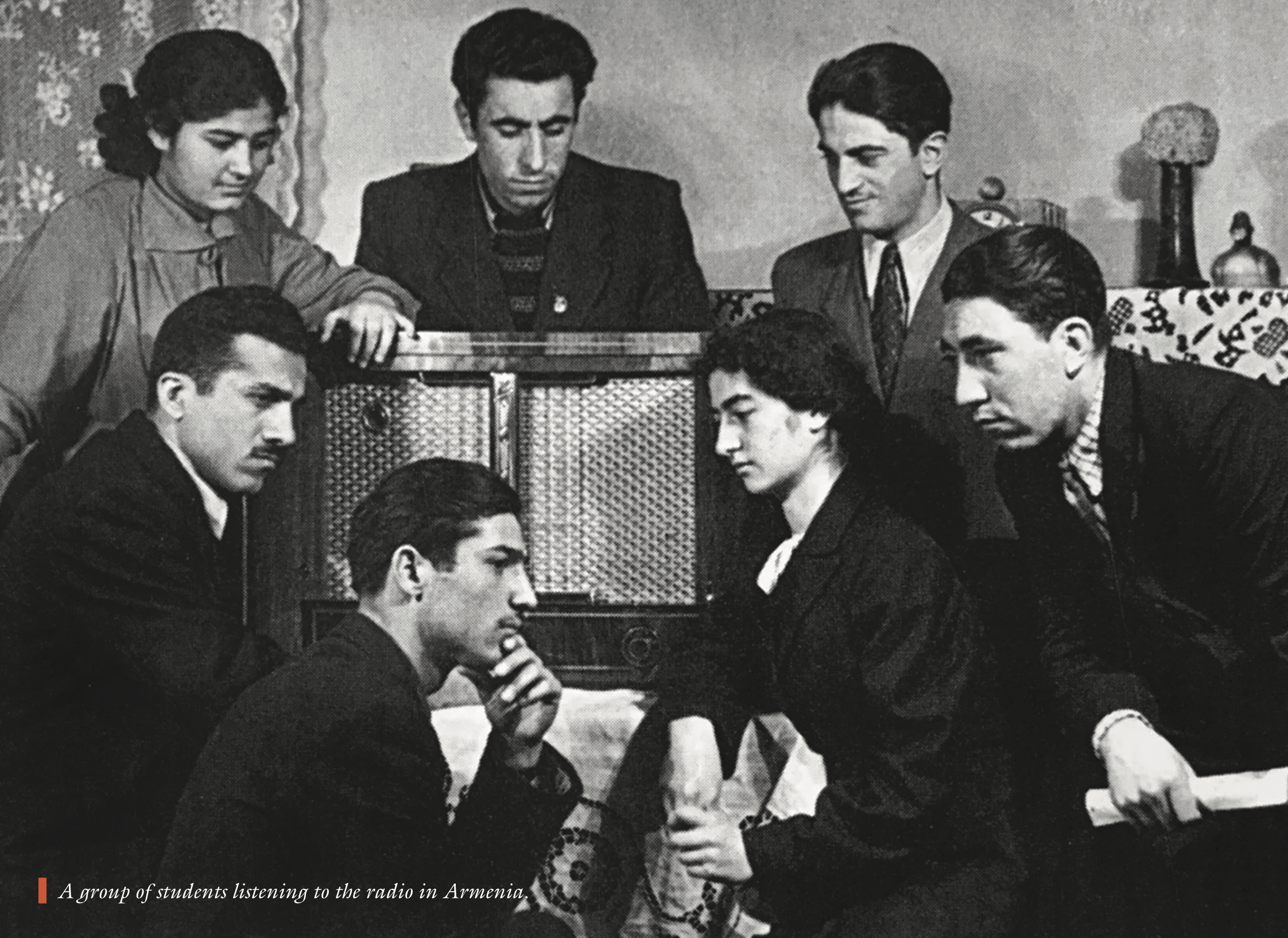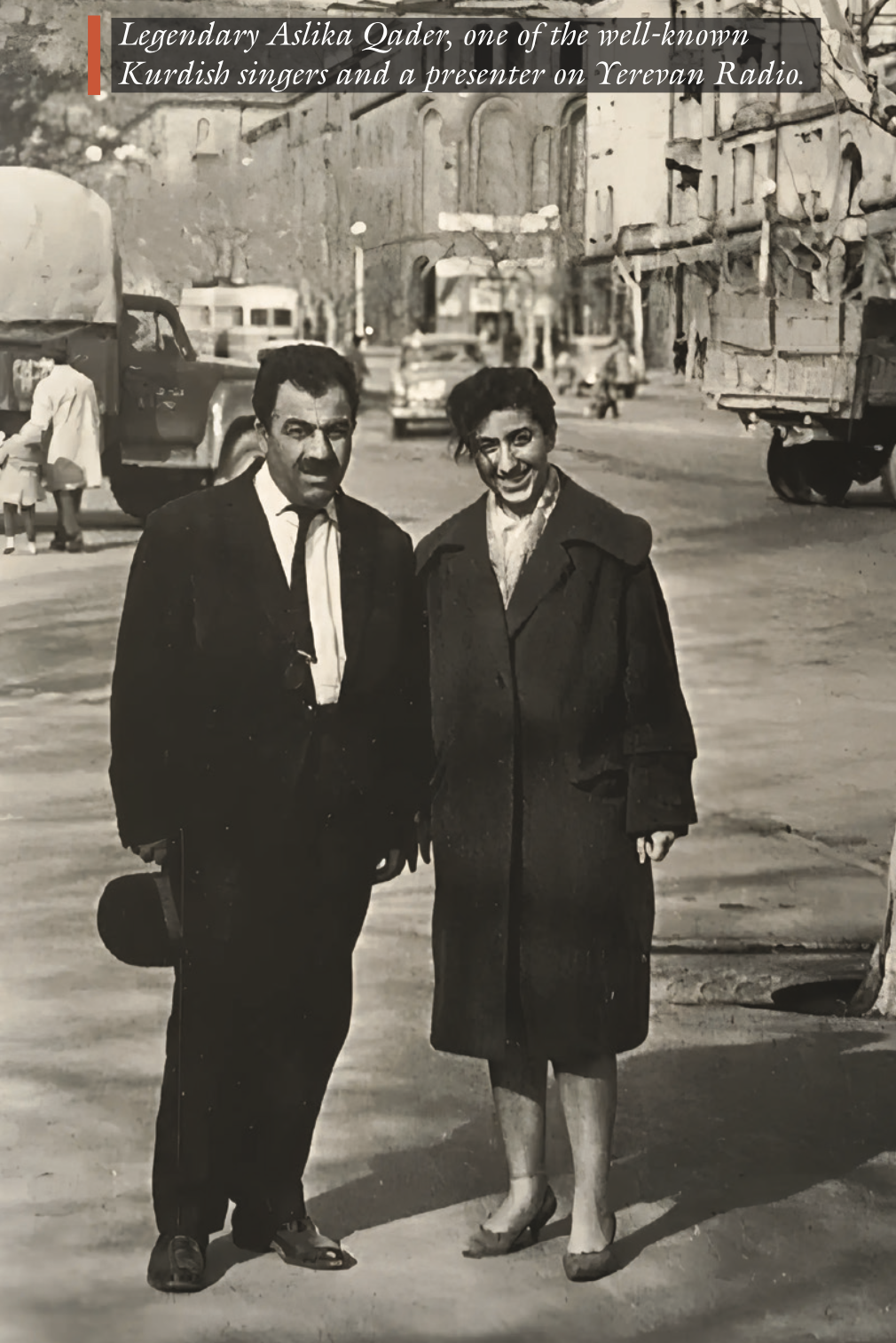The sound of my mother’s voice urging me to “press that button and turn the radio on” is a key memory from my childhood. Back then, in the absence of the internet and social media, Radio Rewan was our window to the world.
Kurdish music filled our home, punctuated by listener requests for their favorite songs. Radio announcers meticulously read out names and locations, sometimes extending the suspense.
During summer trips to Kars, a Kurdish-populated area in eastern Turkey, the sight of Mount Agri (known to Europeans as Mount Ararat) and the distant city of Yerevan would instantly conjure up Radio Rewan. Its broadcasts were crystal clear, thanks to the region’s proximity to Armenia.
The radio station was known by many names: Radio Rewan, the Kurdish section of Public Radio of Armenia, Kurdish Radio, or the Kurdish broadcasting of Radio Rewan.
A haven for Kurdish culture
Despite the animosity towards Armenia and the Soviet Union in 1970s Turkey, Radio Rewan’s broadcasts offered a lifeline. News and songs in urdish language resonated deeply. The frequent use of the word “Qers” – the Kurdish name for the city of Kars – resonated in particular, a reminder of the Kurdish heritage of the land we inhabited.
The history of Radio Rewan is intertwined with Kurdish music and the rich musical traditions of Eastern Anatolia and Armenia. Many renowned Kurdish dengbeji (folk singers) and musicians have graced its studios, enriching its legacy. Sadly, many have passed away, while others have emigrated. The sounds of the flute, drum, and mey (lute) have blended with the voices of singers and musicians over the years, creating a unique sonic tapestry. Egide Cimo stands out as one of Radio Rewan’s most influential Kurdish artist and musicians.

Uncovering the origins
For a long time, many believed that Radio Rewan was founded in 1930, lacking concrete evidence. However, My Memories, Frida Haji Jawari’s 2010 memoir, sheds light on its earlier inception. Her parents, Zeyneb Ibo and Haciye Cindi, worked as hosts from 1930 to 1937, broadcasting news, short stories, and poems in Kurdish. Initially, broadcasts lasted five minutes, but gradually extended to fifteen. Frida Haji Jawari published a photograph of a document written by Yexish Hovanesyan, the head of the Public Radio of Armenia.
Radio Rewan’s official founding year is recognized as 1955. It functioned in tandem with Reya Taze, a Kurdish newspaper, representing the first time that Kurds in Armenia had access to two such significant media resources. Funded and protected by the state, these outlets provided a platform for Kurdish voices for many years. Meanwhile, millions of Kurds in Northern Kurdistan (southeastern Turkey) remained deprived of such a right, silenced by Turkish authorities.
Guiding hands
The Kurdish section of Public Radio of Armenia launched test broadcasts in early 1955 and transitioned to regular programming in 1957. Jasim Jalil served as the head of the station for several years. His family also made significant contributions: his daughter Jamila Jalil worked as a host for 35 years, his son Ordikhan Jalil was host for a few years, and Gulizar Jasim also served a brief stint as a host.
Khalil Muradov took over in 1957 and remained at the helm for 24 years. His wife, Ezniva Rashid, predated him as a radio host, ultimately dedicating 27 years to the station. Their son Temur Khalil, who currently resides in Sweden, also worked as an editor from 1981 to 1984. In 2024, a party was held in Stockholm in honor of what would have been Khalil Muradov’s 100th birthday, attracting Kurds from Georgia who shared their memories of him.
Both Jasim Jalil and Khalil Muradov were well-known writers, and their families played a pivotal role in shaping Radio Rewan’s cultural impact. Following Khalil Muradov’s passing, Ahmed Gog assumed leadership.

Inside the studios
Established in 1927, Public Radio of Armenia celebrated its 50th anniversary in 1977, with the Kurdish newspaper Reya Taze dedicating a full page to the event. This included a fascinating article by Baba, offering a glimpse into the daily operations of the Kurdish Department during that era. After preparing news for local and international audiences, personalities like Kerem Seyad, Ezniva Rashid, and Sevaza Evdo took turns presenting the broadcasts. Translators like Iskhane Eslan also played a crucial role in translating foreign language content into Kurdish.
Documenting the legacy
Recent years have witnessed a surge of interest in Radio Rewan’s archives and influence. Books by Zeri Inanc, Javad Marvani, and Kamran Elend explore the station’s impact in Turkey. Interviews and features have also been published. Zeri Inanc’s bilingual Kurdish-Turkish book, The Voice of Kurds in Radio Yerevan, published in 2017, is a compilation of interviews and articles on Radio Rewan published by the Ismail Besikci Foundation. An accompanying interview with the author appeared in Agos newspaper in February 2017.

Another notable work is the four-volume collection titled Songs of Yerevan Radio Archive, featuring 915 tracks with musical notations and lyrics, available in digital format for listening and reading on the internet.
My own research on the Reya Taze newspaper unearthed a treasure trove of articles and news items about Radio Rewan. The archived photographs of singers and artists, unseen elsewhere, were a particular delight. Ten of these photographs found their way into my March 2023 article titled “Kurdish Radio in a Reya Taze” published in Gazete Duvar, and later, into my book on Reya Taze newspaper.
This historical photograph depicts a group of Kurdish students present at the inauguration of Radio Rewan in 1955. From the front row (left to right): Ordikhane Jalil (holding a symbol), Jalil Jalil, Sima Semend, Seref Esir. In the second row (left to right): Emma Usiv, Majite Bisho, and Ilice Rashid.

Sima Semend: A literary voice
Sima Semend joined Radio Rewan in 1963, dedicating nearly four decades to the station. Rising through the ranks, she eventually headed the literature department. Her contributions included numerous programs exploring Kurdish and Armenian literature, as well as the experiences of Kurdish women. A list of these programs is included in her book Keder, published in 2009. Particularly popular were her reports on Kurdish women, totaling around 46. Her husband, Karlen Cacani, also played a part in Reya Taze’s history. Their complementary roles in the publishing world and their dedication to Armenian and Kurdish culture are a testament to their partnership (see my article: “Sima Semend: “Qiza kurde aza, binivise...,” published in Gazete Duvar in December 2023).
Aslik Qadir: A star takes the stage
Another source of personal satisfaction was meeting the renowned and legendary singer, Aslika Qadir. After immigrating to Germany in 1991, her Kurdish memoirs were published in Istanbul in 2023. Reading her book provided a deeper understanding of this remarkable Kurdish artist. I also contributed an introduction to her work in an article in the magazine Nûbihar.
Rohat Alakom is a Kurdish writer from Turkey. He has penned around 15 books on culture and history published in Kurdish, Turkish and Swedish. Some of his reviews have also been translated into other languages.

